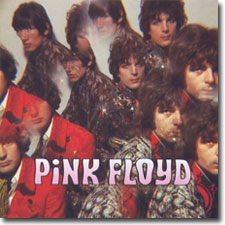Pink Floyd
- title
The Piper At The Gates Of Dawn
- label
Capitol
- format
- CD
 Lysergic yet lucid – that's what Syd Barrett was for a brief window of time in 1966 and 1967. Piper at the Gates of Dawn documents Barrett at the height of his staggering creative powers.
Lysergic yet lucid – that's what Syd Barrett was for a brief window of time in 1966 and 1967. Piper at the Gates of Dawn documents Barrett at the height of his staggering creative powers.
Piper was recorded at almost exactly the same time as Sgt. Pepper, and certainly with a fraction of the budget. For my money, Pink Floyd's psychedelic classic is at least as impressive. Baroque songs that required multi-track overdubs are often cited in conjunction with the Beatles' decision to stop performing concerts after 1966. No such concerns prevented Pink Floyd from staging all night happenings, which established Pink Floyd as "the next big thing" in London.
It's easy to imagine Paul McCartney feeling threatened by albums like this, just as he is widely reported to have felt threatened by The Beach Boys' unfinished Smile album. The threats were short-lived since Brian Wilson and Syd Barrett both experienced debilitating mental health setbacks fueled in large part by the drugs that helped inspire their artistic breakthroughs. Unlike The Beach Boys, Pink Floyd managed to realize and release their masterpiece before losing the services of their visionary songwriter. The results remain eye-opening and pupil-dilating.
Astronomy Domine evokes sensations of disembodied travel through dimensions just beyond our common notions of space and time. The unmoored perspective accentuates the impact of Lucifer Sam which packs a punch that is matched by very few pop songs – let alone psychedelic pop songs. The overall tendency throughout the album is away from grounded structure, but there is always some tension and there is always some melody (to my ears anyway).
Interstellar Overdrive, the album's centerpiece, is like a spacewalk. The lack of gravity makes this walk very different from the walks we're used to, especially while there's slack in the line connecting us to the mother ship. But the line is always there, and the line is eventually employed (after 8-and-a-half minutes) to reel us back in. Yet even after splashdown, nothing ever looks quite the same again.